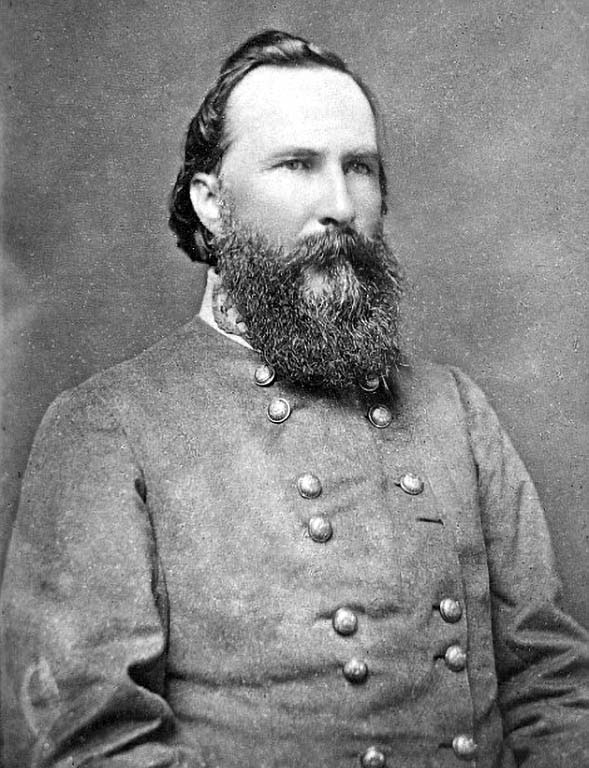
by Steve Parrish
Immediately before the Civil War began many of the general officers who were to ride into history were on active duty in the United States military service. I have discovered that there are some interesting stories related to how some of these generals fulfilled their destiny in the annals of American history. Let me tell you about James Longstreet.
Longstreet has been considered by many historians as a controversial figure among the Southern leaders. He is one of my favorite general officers and I believe wasGeneral Lee’s right hand man throughout most of the war. Despite several ill-fated attempts to spread the blame on junior officers, Longstreet was only human and will historically be remembered as a solid, well-rounded and competent leader. He wanted a generalship badly when everyone knew that war was inevitable, so he took a personal leave from the army and went to his home state of South Carolina seeking an appointment as a general officer. He could not get South Carolina to commission him, so he turned to Georgia stating that it was his home state because he spent many years there being raised by an influential relative who resided there. This too failed as Georgia already had her heroes picked out for the upcoming war. He finally turned to Alabama, where his mother was living and proclaimed it “home”. He was able to get his status there and thus began his colorful adventure.
General Longstreet played a pivotal role in the Battle of Gettysburg and is often regarded as the only southern general who knew the battle was a mistake before it began. The truth is that Longstreet was upset with General Lee to the point that he only did what he was told to do and nothing more. This is unacceptable for a general officer. The third day of the battle was the high water mark for the Confederacy. He was ordered to use General Pickett’s Divisions and others to make the historic charge across the open field to the Union center. He tried to get his artillery commander, Porter Alexander to order the charge because he felt it was doomed to fail and he did not want to be remembered for giving the order. Alexander refused, so Longstreet gave the order and the Army of Northern Virginia suffered a great defeat. Historically speaking as they say, Lee was responsible, but Longstreet was blamed. Still the two greatly admired one another and were masters on the battlefield.
In 1863, a storm was brewing in Chattanooga, Tennessee. Rosecrans and Grant were teaming up to cut the rail lines in the South, so Lee sent Longstreet by rail with his corps to aid General Bragg in an upcoming fight. This would catch the Federals by surprise and led to a huge Confederate victory at Chickamauga. Longstreet became the hero at Chickamauga and would seize this opportunity to try and get Bragg’s job as commander of the Army of Tennessee. The ensuing political fist-a-cuff between the two would cost the Confederacy countless lives; the Battle of Chattanooga; and thereby contribute greatly to the South losing the war. General Longstreet’s brilliance at Chickamauga was historical and many Southern boys (among them regiments from Henry County) shared in this great victory. Once victorious, Longstreet tried some back door politics to get command of the Army from an inept Braxton Bragg. What he did not realize was how well connected Bragg was in Richmond. His plans backfired and when Bragg learned of Longstreet’s attempt to dethrone him. Bragg sent Longstreet to Knoxville to pry the entrenched Yankees out of that city knowing they were dug in like a tick. Bragg set up his command on Missionary Ridge east of Chattanooga as Longstreet marched north. Their political clash led to the both armies being soundly defeated. Longstreet was embarrassed by the whipping at Knoxville and his subsequent blaming the loss on General McLaws; and Bragg was replaced shortly after Chattanooga by Joseph E. Johnston because nobody should have taken the hill he was occupying. Longstreet fought a series of smaller battles before hooking back up with Lee before the Battle of the Wilderness where he was wounded and remained relatively unnoticed until the end of the war. Bragg got a desk job in Richmond where he probably should have been from the beginning.
I guess politics has not changed much in past 140 years. From General Longstreet’s perspective, we can learn two things. First, the best person does not always get the job; our destiny should be left in God’s hands and secondly, if you’re going to play stick-ball in Brooklyn, you better know the rules!
[Steve Parrish is Lt. Commander of the Henry Light Infantry Camp #1968, Sons of Confederate Veterans.]



